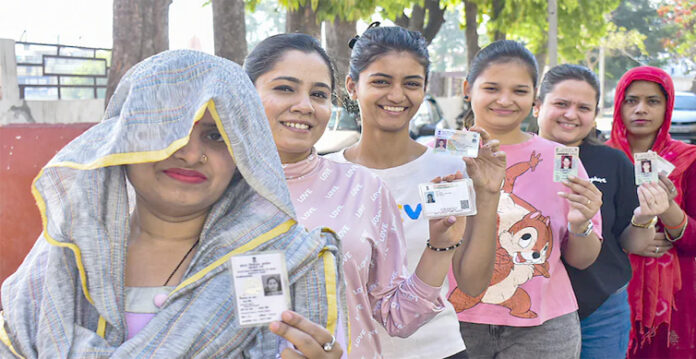As the Assembly elections in Delhi approach, the political landscape is heating up with students from various educational institutions sharing their opinions on the upcoming contest. The debate has become especially significant as these students, many of whom will be first-time voters, offer their perspectives on the performance of the Aam Aadmi Party (AAP) government and whether a shift in power is warranted. Their views reflect a wide array of concerns, from governance and public services to the role of freebies in shaping electoral outcomes.
Many students have voiced frustration over what they perceive as AAP’s failure to address critical issues like pollution, sanitation, and traffic management. Navya Malhotra, a first-time voter, was particularly vocal in her criticism. According to Navya, the AAP government has failed to tackle pollution effectively, which has, in turn, disrupted education and daily life for many students. “We were not able to go to schools or colleges because of pollution,” she said, highlighting a personal grievance shared by many in the city. This dissatisfaction is compounded by the growing perception that the AAP’s promises, particularly in waste management and slum redevelopment, have not materialized into tangible improvements.
On the other hand, these students are also hopeful for a change in power, with many expressing support for the Bharatiya Janata Party (BJP). Aksh, a B Pharmacy student, noted, “There are only two major parties—AAP and BJP. The Congress doesn’t even figure in the discussion in Delhi.” His support for the BJP is rooted in the belief that the party’s “double-engine” governance model could bring about significant development and welfare improvements, especially for the middle class, which he believes has been left behind by AAP’s policies.
Also Read:J&K polls: First-time voters seek jobs, development
Navya, too, expressed a desire for the BJP to take the reins, pointing out that the AAP’s rhetoric around statehood and external barriers did not justify their ten years of inaction. With regards to law and order, she echoed concerns that many female residents of Delhi feel unsafe, despite the AAP’s installation of security cameras. She argued that a change in leadership could address this critical issue, saying, “Delhi, which has been given the title of ‘rape capital’, if that can be changed by a ‘double-engine’ government BJP, then why not?”
Despite these criticisms, there are still students who firmly back AAP. Raees, a student at Delhi University, believes that AAP will maintain its hold on power. He argues that the party’s connection with women voters and its promise of freebies gives it a strong electoral advantage. With AAP’s focus on providing financial support to women, including their flagship schemes like free electricity and water, Raees suggests that the party’s established vote bank will ensure its return to power.
The upcoming elections in Delhi will undoubtedly be a fierce contest between the AAP and BJP, with the Congress playing a more peripheral role. While the BJP has launched its own manifesto, which includes support for pregnant women and financial assistance to lower-income groups, AAP has focused on its delivery of basic services over the past decade. However, the question remains: has AAP’s performance in government been enough to retain voter trust, or will Delhi’s electorate demand change?
For the students who will soon cast their ballots, this election represents not only a personal milestone but also a reflection of the city’s evolving political dynamics. Their diverse opinions underscore the complexity of the issues at play—from governance failures to concerns over women’s safety and infrastructure—making it clear that the stakes are high for the future of Delhi. Whether the next government will be AAP or BJP, one thing is certain: the voices of Delhi’s youth will play a pivotal role in shaping the outcome.
(This story is sourced from a third-party syndicated feed. Raavi Media takes no responsibility or liability of any nature. Raavi Media management/ythisnews.com can alter or delete the content without notice for any reason.)


